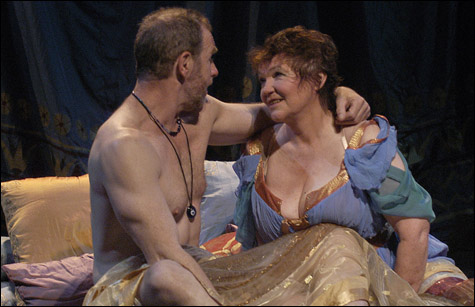Antony and Cleopatra and A Midsummer Night’s Dream at S+C
By CAROLYN CLAY | August 15, 2007

ANTONY AND CLEOPATRA: Lean, mean, and with a miscast queen. |
LENOX — Critic Harold Bloom compares Cleopatra, more in her infinite vitality than in her “infinite variety,” to that Shakespearean life force Sir John Falstaff. Perhaps he, then, would approve Shakespeare & Company artistic director Tina Packer’s rendering of “Old Nile,” which is bawdier than seductive. It’s not that Packer is too old; Vanessa Redgrave played Cleopatra at 60, and she’s surely not the only aging diva to take on the Bard’s aging diva — who in ANTONY AND CLEOPATRA is rendered as a more seasoned mantrap than the actual Cleopatra was when she made Marc Antony her third Roman conquest, after Gnaeus Pompey and Julius Caesar. Neither is it that Packer’s performance chops are dull: despite having put acting on the back burner while she steered S&C through its first 30 years, this hands-on acting teacher has galvanic force and a sonorous, full-bodied way with Shakespearean verse. The scene in which she attacks the messenger bringing news of her lover’s politically expedient marriage, then rears up before buckling in palpable physical pain, makes your hair stand on end. But there is too much of “dungy earth” — a territory claimed for the pair by the Egyptian queen’s over-the-hill Roman-soldier paramour — about her. Approaching her ritual, theatrical suicide, Cleopatra declares, “I am fire and air; my other elements I give to baser life.” And that is not something the warm, hearty Packer is capable of doing.
So it is that S&C’s Antony and Cleopatra (in repertory through September 2) starts out with one strike — a miscast Queen of the Nile — against it. Although one misses such fine S&C defectors as Jonathan Epstein and Dan McCleary, Nigel Gore, who last summer played Claudius to Packer’s Gertrude in Hamlet (her first foray onto the Shakespeare boards with the troupe she founded), is less an oddity as Antony. The English import proves a volatile, self-aware if besotted, aptly grizzled Antony. He even brings to the character some well-earned ironic exasperation, as when he learns that rumors of Cleopatra’s death (started by her) have been greatly exaggerated. Of course, this Plutarch-inspired play — part tragedy, part history — is as much about the showdown between up-and-coming ruler-bureaucrat Octavius Caesar and outmoded “Herculean Roman” Antony for control of the Empire as it is about the unstable if unstoppable passion of Antony and Cleopatra for each other and their mirroring mythologies. And the S&C production, helmed by associate artistic director Michael Hammond, makes the politics of the play — ruthlessly rational on Caesar’s part, eruptive and distrustful on Antony and Cleopatra’s — unusually clear.
 Topics
Topics:
Theater
, Culture and Lifestyle, History, John Falstaff, More  , Culture and Lifestyle, History, John Falstaff, Jonathan Epstein, Joseph Mankiewicz, Tony Molina, Michael Solomon, World History, Harold Bloom, William Shakespeare, Less
, Culture and Lifestyle, History, John Falstaff, Jonathan Epstein, Joseph Mankiewicz, Tony Molina, Michael Solomon, World History, Harold Bloom, William Shakespeare, Less 